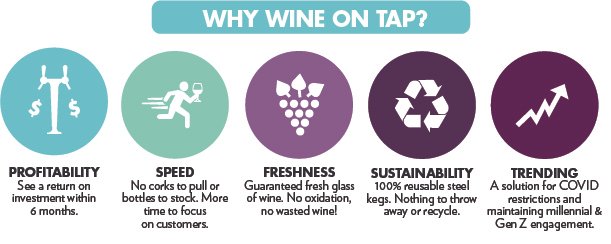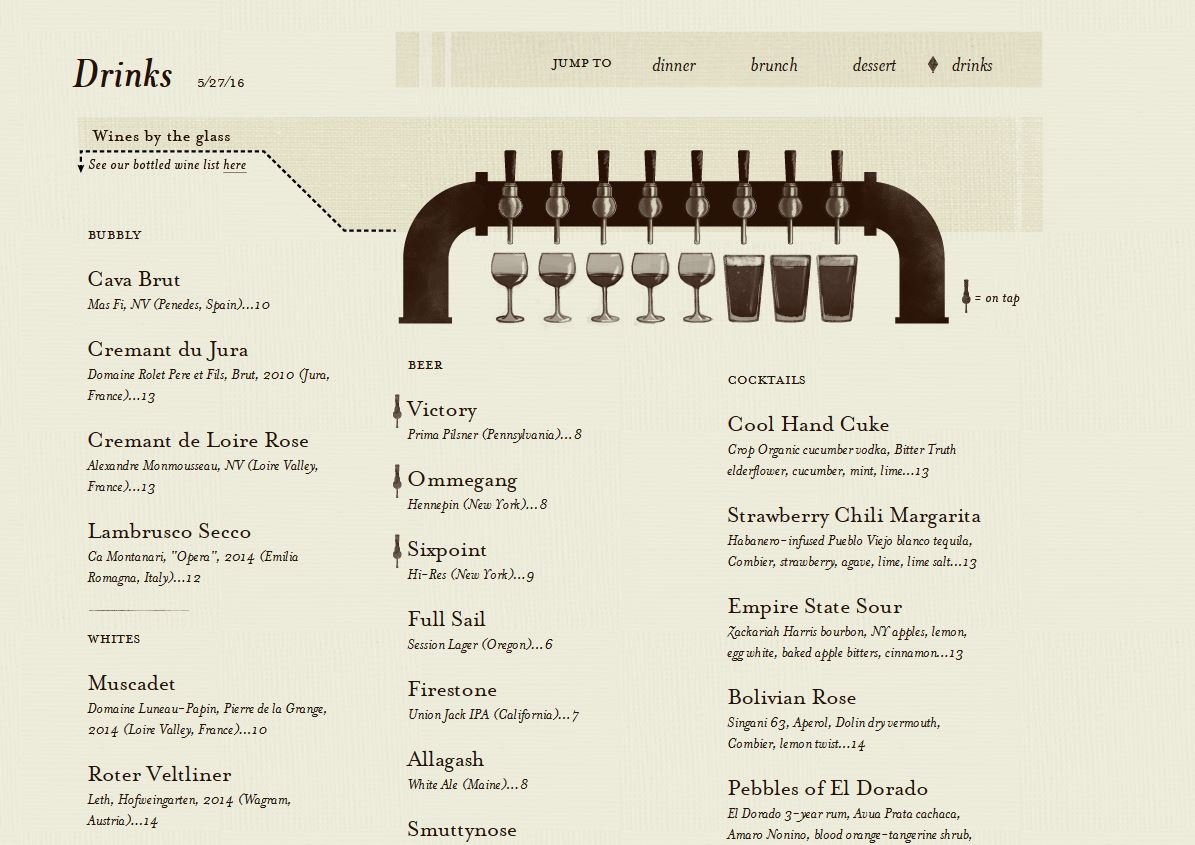TOP EIGHT WINE ON TAP MYTHS
Wine on tap has its fair share of myths. We at Free Flow Wines want to debunk those myths and help wineries, restaurants, hotels, and other venues expand their zero-waste efforts by switching their by-the-glass wine programs from glass bottles to steel kegs.
Myth #1: Only low-quality wine is packaged in a keg & served on tap
Quite the contrary! Quality preservation is the primary reason for pouring wines on tap. If a winery wants to sell on-premise, they may choose to keg their wine instead of bottling it. The steel keg will preserve freshness from the first pour to the last. Bottles used for by-the-glass programs can be problematic for a variety of reasons:
Wine may be corked
Bottles opened for too long will oxidize the wine
Bottles are often not stored properly and can spoil the wine
Glass bottles can expose the wine to sunlight or heat
Staff may not be able to assess an opened bottle’s quality
All these factors impact the consumer and their impression of that glass and that wine brand. Steel kegs protect wine from temperature fluctuations, light, and oxygen. This means every glass poured is identical, and the quality is consistent.
Because of that consistent quality, many wineries choose to keg their wines for by-the-glass programs to ensure their consumers are getting the best experience with their wine.
See which brands are currently available in our steel kegs
Myth #2: There are more emissions associated with the transportation of steel kegs
Free Flow Wines specifically chose steel kegs because of their reduced carbon footprint compared to glass bottles and disposable plastic kegs. The combination of optimized logistics, reduced packaging weight, and reusable packaging — there is nothing to recycle or throw away — makes steel kegs the most sustainable package for wine-by-the-glass programs. Overall, there is a 96% reduction in wine’s CO2 footprint when packaged in a steel keg compared to a glass bottle.
Overall, there is a 96% reduction in wine’s CO2 footprint when packaged in a steel keg compared to a glass bottle.
Because sustainability is the driving force for Free Flow Wines, to help reduce emissions even further, Free Flow added a second filling station on the East Coast to make our already strategic logistics, even more, reduced-emissions focused.
The Truth About Recycling
While we all want to believe all items in our recycling bins are recycled, only 39% of glass bottles get recycled. This is partly because many curbside recycling programs are no longer taking glass: the glass tends to break in the bins and contaminate the rest of the recyclable materials which then diverts everything within that bin to landfills. Essentially 26 bottles are saved from landfills per keg fill. Now imagine how many are saved throughout the keg’s lifetime!
Essentially 26 bottles are saved from landfills per keg fill. Now imagine how many are saved throughout the keg’s lifetime!
Myth #3: Wine will spoil quickly
Wineries have used steel tanks as a part of their winemaking process for decades. Steel is the most reliable material because it creates an airtight, impermeable vessel for wine.
Once a steel keg is tapped, the wine is still protected from oxygen, light, and temperature shifts. The wine quality is preserved perfectly until its last pour. This makes steel kegs one of the most reliable packages for maintaining the integrity of the wine.
Myth #4: All kegs for wine on tap are made from steel
Disposable plastic kegs do exist. However, steel kegs are far superior for maintaining wine quality and reducing the carbon footprint of wines served on tap. Not to mention, while advertised as recyclable, the PET disposable kegs are not actually recyclable in the US due to their large format and the multiple types of plastic used in their construction. As a result, most are sent to the landfill, chipped, or incinerated.
PET disposable kegs are not actually recyclable in the US due to their large format and the multiple types of plastic used in their construction.
Free Flow Wines chose steel because it is part of the circular economy: it can be reused indefinitely. Businesses aren’t responsible for their disposal and businesses don’t have to worry if the packaging is recyclable. (Remember the single-stream bins we referred to earlier? There’s a lot of rules of what can and cannot go into them.)
Our steel kegs are reusable for 30+ years and both steel and aluminum are 100% recyclable.
This is one of the reasons Free Flow Wines chose steel kegs and aluminum cans as alternative packages for wine. Our steel kegs are reusable for 30+ years and both steel and aluminum are 100% recyclable. And, unlike plastic, they are both cheaper and more energy-efficient to recycle than producing new materials.
Myth #5 - It’s expensive to install draft lines
There are a variety of dispense options for draft wines. Many of them are mobile, so retrofit or additional space for refrigeration isn’t necessary. Most accounts see a return on investment within six months of adding wine on tap. Free Flow Wines offers financing programs to help with the initial investment.
Other cost-effective solutions include converting existing beer taps to dispense wine or opting for a no-install, Bar-Top Unit. Free Flow Wines has lease-to-own options for these units, so accounts can start serving wine-on-tap immediately.
Myth #6: Kegging outside my state means I can’t label my wine from my region
Kegs need a keg collar with specific TTB requirements that will include the city your wine was packaged in. However, that keg collar is for legal purposes only and stays with the keg. It is not meant for consumers to see. Instead, consumers will see a wine-on-tap menu.
Depending on the wine menu, customers will likely see your wine’s brand, varietal, vintage, appellation, and winery location. Your customers will see where you and your wine are from but not where it was packaged.
Myth #7: Keg logistics are a hassle
Free Flow Wines’ winery partners don’t have to coordinate the logistics of the steel kegs. Wineries can simply ship their wine to us and then we do the rest! On-premise establishments will then work with the distributors on delivery and pick up. Learn about our no-hassle logistics here.
Myth #8: Toxic chemicals are used to clean wine kegs
Free Flow Wines exclusively packages wine and wine only. The materials used to clean kegs are the same materials used in winery cellars. Our kegs are rinsed with water, cycled with caustic & citric, and sterilized with steam. 95% of our wastewater is reclaimed in our closed-loop water reclamation system ensuring limited waste and water usage without compromising the integrity of the wine.
95% of our wastewater is reclaimed in our closed-loop water reclamation system
Wine in a steel keg has many valuable qualities from freshness to sustainability. It's a package that delivers a by-the-glass wine experience without compromising quality or the environment.
Want to know more about wine in steel and wine-on-tap? Call us directly at 855.KEG.WINE or fill out the form below:


